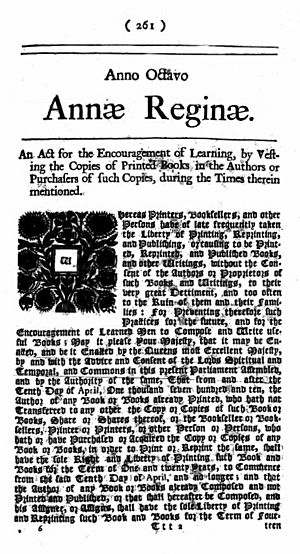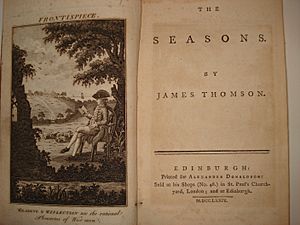Donaldson v Becket facts for kids
Donaldson v Becket was an important legal case decided in 1774 by the British House of Lords. This ruling made it clear that copyright for published books and other works does not last forever. Instead, it has limits set by law. This decision was a big deal for authors, publishers, and the public.
Contents
Who was Becket?
The main person on one side of this case was Thomas Becket. You might sometimes see his name spelled "Beckett" with two 't's. However, the correct way to spell his name is "Becket" with one 't'. This is how he usually spelled it himself. Also, many of the original court documents from that time used the spelling "Becket." Early reports of the case also used this spelling. The "Beckett" spelling became more common later, mostly because of changes made by editors and clerks in the early 1800s.
Why the Case Happened
The first modern copyright law in Britain was the Statute of Anne, passed in 1710. This law gave authors and publishers the right to control their books for 14 years. If the author was still alive, they could extend this right for another 14 years. For books already published before this law, they got 21 years of protection.
When these 21 years were up, many booksellers (who often owned the copyrights) wanted to keep their rights. They asked Parliament to extend the copyright, but Parliament said no.
So, the booksellers tried to get the courts to agree that they had a natural, never-ending right to copyright under common law (law based on customs and court decisions, not written statutes). They even set up a fake lawsuit, Tonson v Collins, but the courts stopped it.
Later, another case, Millar v Taylor, came up in 1769. This case was about James Thomson's famous poem "The Seasons". The booksellers won this case, which made it seem like copyright could last forever.
Donaldson v Becket was then brought to court, also about "The Seasons." Because of the Millar v Taylor decision, a court first stopped Alexander Donaldson from publishing the poem. Donaldson then appealed this decision to the House of Lords. At that time, the House of Lords was the highest court in the United Kingdom.
What Happened in Court
The Arguments
Lawyers presented their arguments in February 1774. Just a few months before, in Scotland, a court had ruled that copyright did not exist forever under Scottish common law. This meant that Alexander Donaldson could publish books freely there.
The lawyer for Donaldson, Attorney General Thurlow, mentioned this Scottish case. He hoped that the House of Lords would also decide that copyright should not be a never-ending "monopoly" (when one person or group has total control over something) held by a few booksellers.
The Judges' Questions
When the House of Lords had a difficult case, they would often ask the country's top judges for their opinions on specific questions. This helped the Lords make their final decision.
The Lord High Chancellor, Lord Apsley, asked the judges three main questions:
- Did an author have the sole right to print and sell their book at common law?
- If so, did they lose that right once they published the book? Could anyone then reprint and sell it without permission?
- If an author had such a right, did the Statute of Anne take it away? Did the law mean authors only had the rights given by that statute?
Two more questions were added by Lord Camden:
- Did authors and their heirs have the sole right to print and publish their works forever under common law?
- Did the Statute of Anne change or remove this never-ending right?
The first set of questions focused on authors' rights, while Lord Camden's questions specifically looked at the idea of a "perpetual monopoly" (a never-ending exclusive right).
The Judges' Answers
The judges gave their answers over several days. Here's a simplified look at what most of them thought:
- Most judges (eight out of eleven) agreed that authors had a right to control their work before it was published.
- Most judges (seven out of eleven) thought that authors did not lose their common law rights just by publishing their work.
- However, a majority of judges (six out of eleven) believed that once a work was published, the Statute of Anne did take over. This meant the common law rights were replaced by the limits of the statute.
- Most judges (seven out of eleven) thought that, at common law, authors had a never-ending right to publish their work.
- But, a majority (six out of eleven) also thought that this never-ending right was limited by the Statute of Anne.
So, while many judges thought a never-ending copyright might exist in common law, most also agreed that the Statute of Anne put a time limit on it once a book was published.
The Debate and Vote
On February 22, the House of Lords debated whether to overturn the earlier court decision that favored the booksellers. Several Lords spoke. Lord Camden was very critical of the booksellers. He said their arguments for never-ending copyright came from old, unfair rules and monopolies, not from true common law.
In the end, the House of Lords voted to overturn the decision against Donaldson. This meant they rejected the idea of copyright lasting forever for published works. They decided that published works must follow the time limits set by the Statute of Anne. After that time, the works would become part of the public domain, meaning anyone could use them freely.
For many years, people thought the vote was a formal "division" where each Lord's vote was recorded. However, later research showed it was a voice vote. This means we don't know exactly how many Lords voted or how each one voted.
Why This Case Was Important
When the news of the Donaldson v Becket decision reached Scotland, there was great celebration. People lit bonfires and had illuminations (lights) in Edinburgh, showing how happy they were that the "monopoly over literary property" was defeated.
Later that year, British booksellers tried to pass a new law to extend their copyright to 14 years, but the House of Lords rejected it.
This case also influenced copyright law in other countries. For example, in 1834, the United States Supreme Court also rejected the idea of never-ending copyright in the case of Wheaton v. Peters.
Common-law Copyright Explained
The main point of Donaldson v Becket was that once a book is published, its copyright is controlled only by the specific time limits set by laws like the Statute of Anne. It doesn't last forever under common law.
This means that while an author might have a right to their work before it's published (a common-law right), once it's out there, the written laws take over. After the time limit in the law expires, the work becomes free for everyone to use. This decision helped shape modern copyright law, balancing the rights of creators with the public's access to knowledge and culture.
See also
- Copyright law of the United Kingdom
- History of copyright law
- List of leading legal cases in copyright law
- Wheaton v. Peters, U.S. Supreme Court case also addressing the existence of copyright at common law
 | Janet Taylor Pickett |
 | Synthia Saint James |
 | Howardena Pindell |
 | Faith Ringgold |



